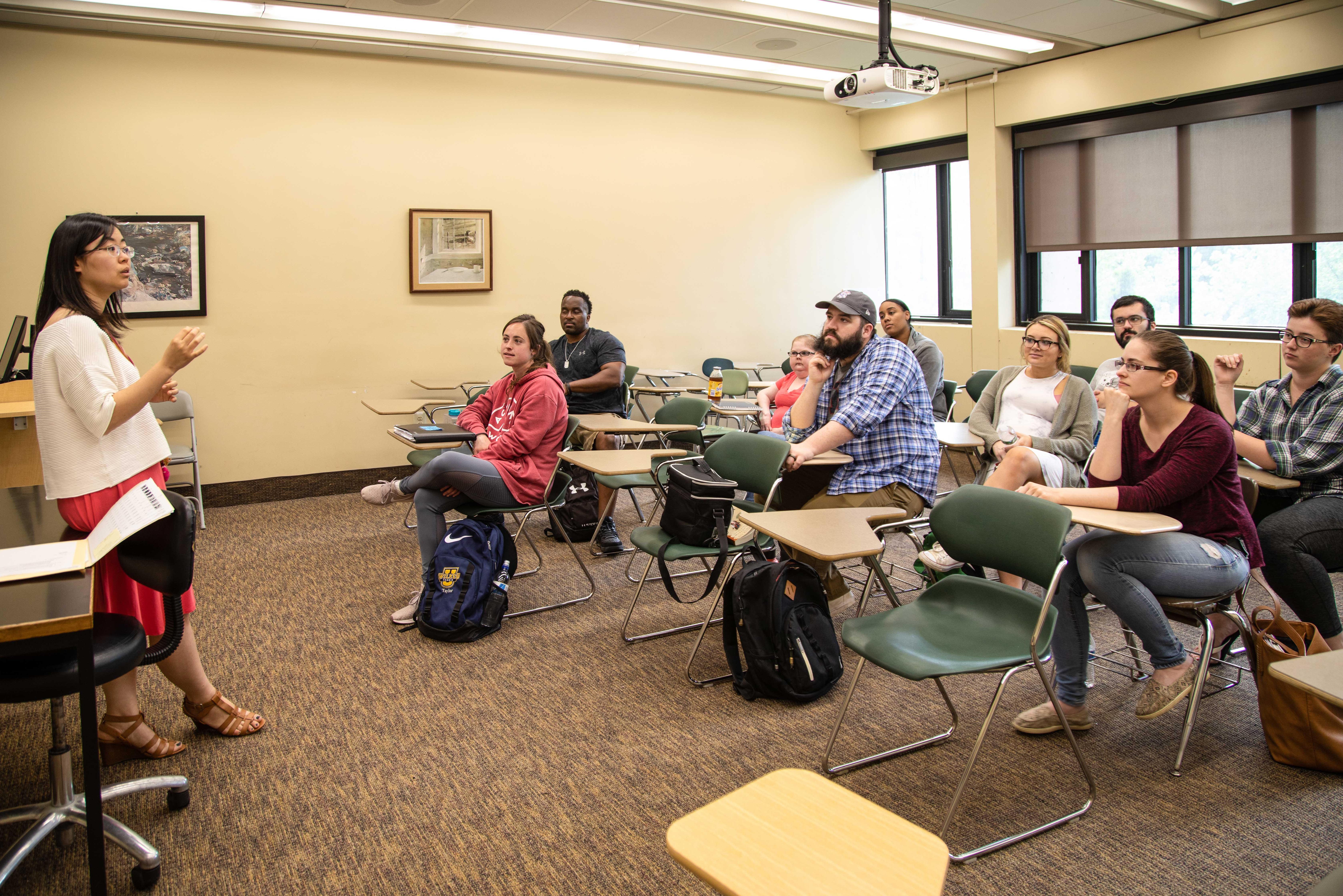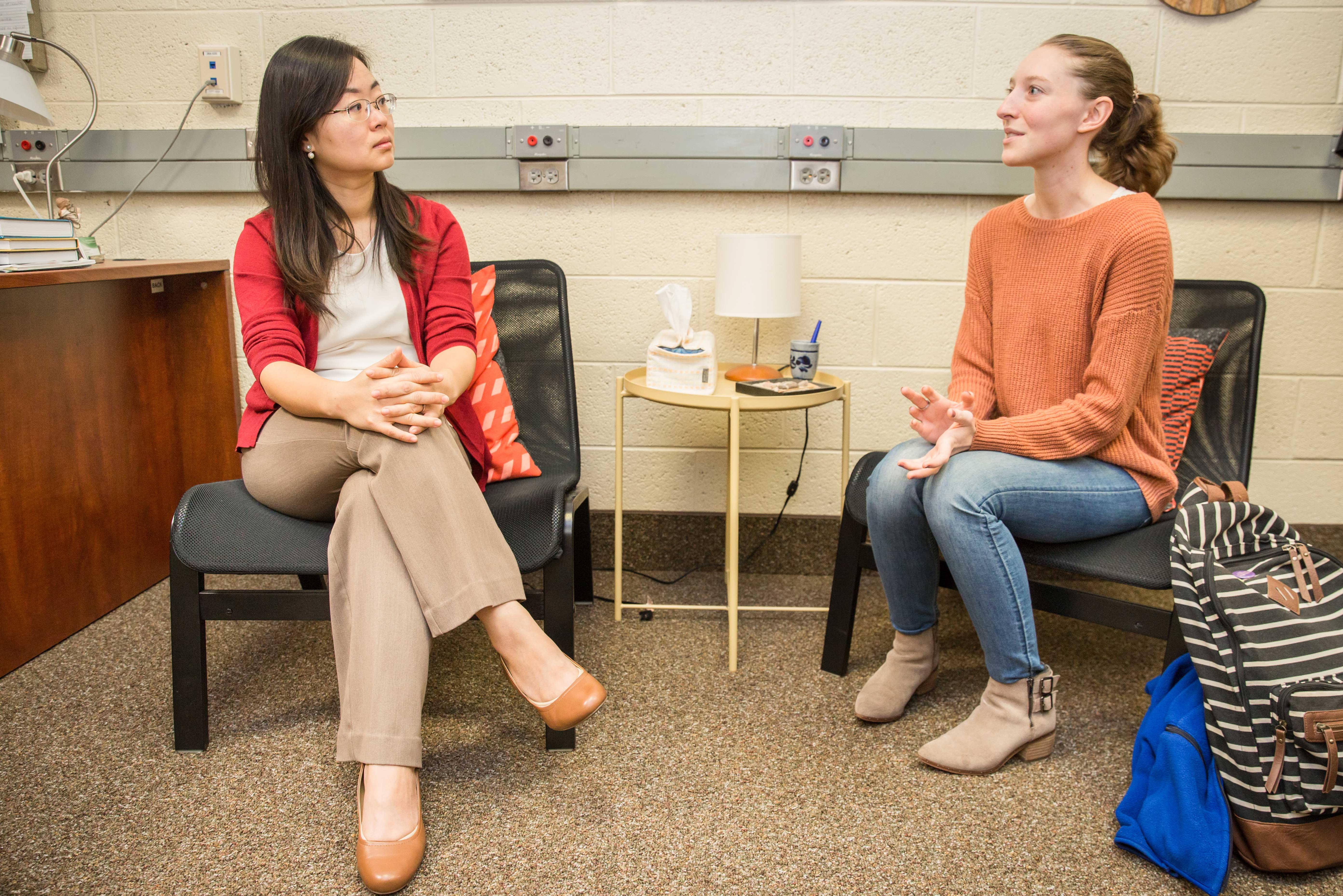Dr. Lee Engages Students in Innovative Counseling Programs
Dr. Hsin-Hua Cathy Lee
Assistant Professor of Psychology
Courses: Theories and Techniques, Educational and Career Counseling, Professional Issues in Counseling, Family Counseling, Couples Counseling, and Internship: Mental Health Counseling
Expertise: Immigration- and acculturation-related issues, international students’ adjustment, and career development, and mental health issues among Asian-American individuals and families
Trilingual: Speaks English, Mandarin, and Taiwanese
Advice for Students: “To be a successful counselor, you must meet the essential qualifications of being flexible and open to feedback. Someone who can sit with intense emotions while simultaneously working with people who have different values and cultural backgrounds.”
“Be mindful of the people around you. If you notice someone struggling, approach them and ask how they are doing. The best thing we can do is listen.”
– Dr. Hsin-Hua Cathy Lee
What began as an exciting ninth-grade summer adventure grew into an unexpected journey from Taiwan to a new home in the U.S. for Dr. Hsin-Hua Cathy Lee. Several years earlier, Dr. Lee’s parents petitioned to immigrate together, but it was decided that she would begin the process on her own with the support of extended family.
Dr. Lee lived with her paternal uncle’s family in Riverside, Calif., a city 60 miles east of Los Angeles, throughout high school before graduating from the University of California, Los Angeles, in 2003. As a Tawainese teen adjusting to life on the West Coast, she experienced firsthand the challenges faced by “parachute kids,” unaccompanied minors who transition to the U.S. and often struggle with acculturation issues.
As an undergraduate, Dr. Lee volunteered her time as a patient interpreter at UCLA Medical Center. She was fascinated by shifts in family dynamics when children assume cultural ambassador and translator roles for non-English speaking parents and grandparents. Later at University at Albany, SUNY, Dr. Lee wrote her Ph.D. dissertation on the impact of acculturation on parachute kids’ family dynamics and mental health, specifically around depression. These professional experiences, combined with her formative journey, developed into a passion for clinical research and family therapy, including treatment for anxiety and depression resulting from identity and culture-based conflict within Asian-American families.

Dr. Lee’s commitment to innovative counselor training programs led her to Arcadia University in 2014, where she teaches graduate courses in Counseling and leads efforts to train highly qualified clinicians who are dedicated to both social justice and evidence-based practices.
“I always felt a calling to train clinicians,” said Dr. Lee. “The Master’s program at Arcadia is a good fit because the emphasis is more on training clinicians than generating research alone. I can focus my attention on teaching and mentoring students.” With a variety of concentrations, the option of three dual-degree tracks, and three certificates, the Master’s program maintains small, intentional classes that highlight collaborative learning, insightful self-reflection, and supportive goal setting.
In 2018, Dr. Lee co-authored an article in The Journal of Family Therapy that investigated the types of culture‐based conflicts that unaccompanied Taiwanese minors experience. This qualitative analysis involved an in-depth study of developmental vs. acculturative issues within Taiwanese-American families, how the meaning of home culture changes over time, parent-child relationships prior to and after immigration, and changes in parent-child dynamics. Dr. Lee concluded that culture played a significant role in parent-child disagreements related to dating, friendships, the balance between academic and extracurricular activities, and the emphasis on extended family as adolescents gained autonomy. Participants themselves later recognized the significant role culture played in their disagreements with parents and showed a deeper understanding of these conflicts when they gained an adult perspective.
Dr. Lee has suggested the importance of multicultural competencies in her research and counseling work with Taiwanese unaccompanied minors and those from similar cultures. For example, because it is difficult to cope with acculturation, peer support and being able to stay in touch with one’s own culture and language are psychologically protective and critical to the individual’s overall wellness. Educators and health professionals should encourage unaccompanied minors to engage with their community and language, which is often contrary to conventional approaches to immediately assimilate students to their new cultural environment. It is also important to recognize the flexibility these adolescents and young adults demonstrate during their transition and create programs that will capitalize on their strengths rather than deficits.

Dr. Lee and Psychology student Lauren Wightman ’20 discuss her internship at a local elementary school.
In addition to her clinical research and work at Arcadia, Dr. Lee maintains a private practice with her husband and partner, Dr. David Kasson. Established soon after the birth of their daughter in 2015, Chestnut Hill-based Kasson Psychological Services offers psychological consultation, individual psychotherapy, family and couples therapy, group counseling, and career counseling. Dr. Lee, who speaks Mandarin and Taiwanese, lends her expertise in serving individuals of Asian-American descent who struggle with immigration and acculturation concerns as well as other mental health issues.
For immigrant populations, language can be a significant barrier to receiving the mental health care they need. Dr. Lee recommends web-based platforms to help connect people with licensed professionals who are multilingual. These online resources use technology to administer critical services and eliminate the obstacles created by both linguistic challenges and physical distance.
Dr. Lee believes care and communication are key to raising mental health awareness and providing support for anyone who may struggle with anxiety, stress, and loneliness.
“Be mindful of the people around you,” said Dr. Lee. “If you notice someone struggling, approach them and ask how they are doing. The best thing we can do is listen.”


